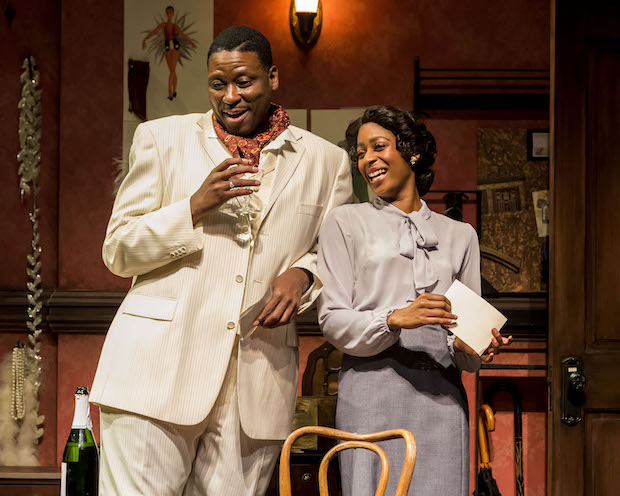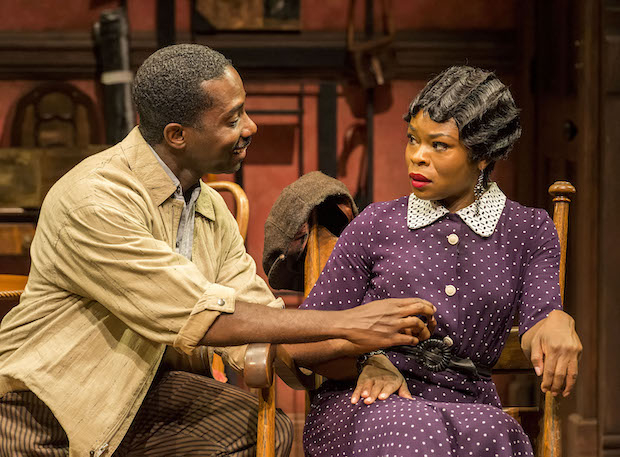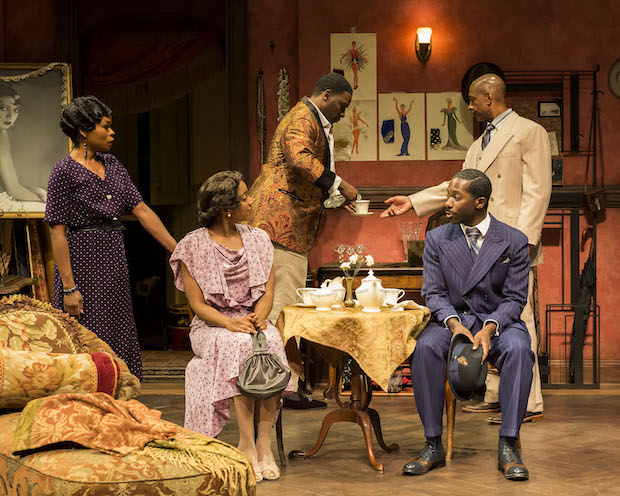Review: Dynamic Performances Fuel Phylicia Rashad's Revival of Blues for an Alabama Sky

(© Craig Schwartz Photography)
Dynamic performances by Nija Okoro and Greg Alverez Reid fuel Center Theatre Group's new revival of Pearl Cleage's Blues for an Alabama Sky. Phylicia Rashad, who originated Okoro's role in the play's 1995 world premiere, returns to direct this humorous production that always simmers with devastation under the surface.
In 1930 Harlem, four friends shoot the breeze and just try to survive the Great Depression. Angel (Okoro), a singer in a nightclub, has lost her job and boyfriend in the same night. Her best friend, the proudly gay costume designer Guy (Reid), continues his post as her constant savior, while struggling to pay rent since he was fired from the same nightclub for defending her to the stage manager. Next door, the shy but resolute Delia (Kim Steele) hopes to start a version of Planned Parenthood in the neighborhood at a time when abortions were illegal. She receives unexpected support from their lothario friend, the doctor Sam Thomas (Joe Holt), who Delia has never previously trusted. Disrupting this close circle of friends is a stranger from Alabama (Dennis Pearson) who has his eye on Angel.

(© Craig Schwartz Photography)
Cleage's play has a racy first act with audiences in-tune to the central friendships. In act two, things turn melodramatic, and the play races to a conclusion that feels predictable. Cleage reveals several Chekhov's guns (one literal and several figurative), so instead of foreshadowing, these hints make the ending expected. Cleage has a keen ear for dialogue and truly understands the nuances of her characters. The laughs come naturally instead of constructed punchlines. The play is entrenched in the real world of the Harlem Renaissance, with the characters' connections to Langston Hughes and Josephine Baker.
All five actors radiate dignity and self-reliance, even if some of the action is questionable. Okoro is captivating, playing Angel as a spitfire filled with longing, but also venom. At times, Angel seems delusional in her own dreams ala Blanche DuBois; at others, she's reckless like Mildred in Of Human Bondage. Reid portrays Guy as a man who'd rather be beaten to death than bury his true self. He is the embodiment of the adage "What others think of me is none of MY business." Holt gives a touching performance as a cavalier jokester who finds love for the first time in 40 years. Steele has a tough role as the plain Jane and doesn't seem to find a fresh spin to keep the audience involved in her story. Pearson has an even more strenuous role as the newcomer set in his own moral understanding. It would be easy to turn this character into a villain, but Pearson finds the humanity in someone who truly believes in purity and debauchery and nothing in between.

(© Craig Schwartz Photography)
Rashad does a great job of visually composing an underprivileged, but jubilant neighborhood that refuses to give up on a golden future. John Iacovelli's set and Elizabeth Harper's lighting design present a worn-down but classy Manhattan walkup, with muted browns that underscore the Depression but lovely tilework that shows how much care went into maintaining this home. Wendell C. Carmichael designs snazzy costumes for Angel – a shoulder-free cocktail dress is exquisite, as is a purple fringe number she wears in act one. The dapper white suits for Guy are as eye-catching.
The play's issues really cause act two to creak. As opposed to celebrating a woman with her own sense of being, the plot feels like movies during the Code era, when free women must be punished, or vulnerable viewers would go astray. Angel was thoughtless and cruel at times, but the heroine of Blues For An Alabama Sky deserved a more honest ending for her choices, not stock condemnations.











